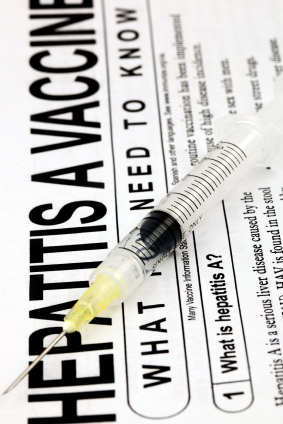 What is hepatitis?
What is hepatitis?
Hepatitis refers to inflammation of the liver. Hepatitis can be caused by many drugs and toxic chemicals, but in most instances it is caused by a virus. Viral types A, B, and C are the most common.
During the period before liver involvement a person with viral hepatitis may experience a loss of appetite, nausea, vomiting, fatigue, and flu-like symptoms that can occur two weeks to one month before liver involvement, depending on the incubation period of the virus. Once the liver is involved a person with hepatitis shows a tender and enlarged liver, fever, jaundice (yellow appearance of the skin), and markedly elevated liver enzymes (aminotransaminases) and bilirubin levels in the blood.
Acute viral hepatitis can be an extremely debilitating disease requiring bed rest. It can take anywhere from two to sixteen weeks to recover. Most patients recover completely (usually by nine weeks for type A and sixteen weeks for types B, C, D, and G). However, about one out of one hundred will die, and 10% of hepatitis B and 10-40% of hepatitis C cases candevelop into chronic viral hepatitis (hepatitis C contracted from a transfusion is associated with a 70-80% chance of developing into chronic hepatitis).
The symptoms of chronic hepatitis vary. The symptoms can be virtually nonexistent or they can lead to chronic fatigue, serious liver damage, and even death due to cirrhosis of the liver or liver cancer.
What causes hepatitis?
Hepatitis can be caused by many drugs and toxic chemicals, but in most instances it is caused by a virus. Viral types A, B, and C are the most common. Hepatitis A occurs sporadically or in epidemics, and is transmitted primarily through fecal contamination. Hepatitis B is transmitted through infected blood or blood products, as well as through sexual contact (the virus is shed in saliva, semen, and vaginal secretion). Hepatitis C (formerly known as hepatitis non-A, non-B) has a primary route of transmission through blood transfusion. In fact, about 10% of people who received blood transfusions developed hepatitis C in the past before the blood supply was checked for the presence of hepatitis C. Other viral causes of hepatitis include: hepatitis viruses D, E, and G, as well as Herpes simplex, cytomegalovirus, and Epstein-Barr virus.
What about chronic hepatitis C?
Statistics from the World Health Organization estimates that 350 million individuals have chronic hepatitis. The most serious form of chronic hepatitis is chronic hepatitis C (CHC). It is suspected that there are, at present, more than 5 million people in the United States that are infected with CHC, and perhaps as many as 200 million around the world (that is roughly 5% of the world’s population). The death rate from hepatitis C exceeds that from AIDS.
The drug of choice in conventional medicine for CHC is now a combination of pegylated alpha-interferon (given by weekly injection) and the antiviral drug ribavarin (given by pill daily). While results are often impressive, this treatment is not a panacea. Natural products can be used as supportive agents to drug therapy or as an important alternative treatment when the drugs fail to improve the condition.
Are there any specific foods useful to support liver function?
First off, it is important to reduce the stress on your liver! For a healthy liver:
- Don’t smoke
- Drink little or no alcohol
- Avoid caffeine
- Avoid harmful chemicals, especially cleaning solvents and pesticides
- Saturated fats and refined sugar
- Drink at least 48 ounces of water each day
- Consume lots of vegetables and legumes for their high fiber and nutrient content
The most important dietary guidelines for good liver function are also those that support good general health. Certain foods are particularly helpful because they contain the nutrients your body needs to produce and activate the dozens of enzymes involved in the various phases of detoxification. Such foods include:
- Garlic, legumes, onions, eggs, and other foods with a high sulfur content.
- Good sources of water-soluble fibers, such as pears, oat bran, apples, and legumes
- Cabbage-family vegetables, especially broccoli, Brussels sprouts, and cabbage.
- Artichokes, beets, carrots, dandelion greens, and many herbs and spices such as turmeric, cinnamon, and licorice.
- Green foods like wheat grass juice, dehydrated barley grass juice, chlorella, and spirulina.
What supplements do you recommend to support liver function?
Foundation Supplements. High potency multiple vitamin and mineral formula; Vitamin D3 2,000-5,000 IU/day; Fish oil, EPA+DHA 1,000 to 3,000 mg/day.
Liver Detox – a formula I developed to provide special nutritional factors to support the liver including N-acetylcysteine and Silybin Phytosome – a special extract of milk thistle bound to phosphatidylcholine. A growing body of scientific research indicates that Silybin Phytosome is better absorbed and produces better results than regular milk thistle extract. Silybin Phytosome is one of the most potent liver-protecting substances known. It protects the liver by:
- Acting as a direct antioxidant and free radical scavenger.
- Increasing the intracellular content of antioxidant compounds.
- Stimulating the formation of new liver cells to replaced those that are damaged
Take two capsules daily.
How do I know if the recommendations are working?
Blood tests can be used to monitor the success of this program to support liver function.
Additional comments:
This program can be used with standard medical treatment. In fact, it may help reduce side effects and increase the effectiveness of the drugs. If positive results are apparent, the protocol can and should be followed indefinitely. However, if positive results are not apparent after 3 to 6 months I recommend simply taking the foundation supplements. The program is generally very well tolerated. I recommend taking the RxOmega-3 Factors just before meals to avoid burping up any fish oil odor.


